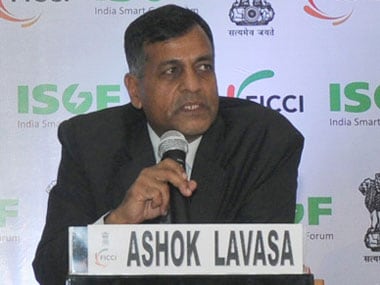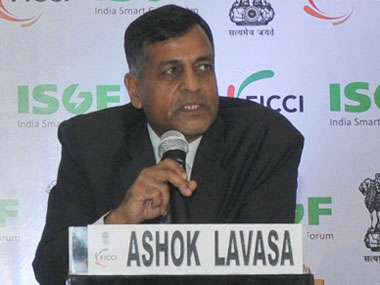On Friday, several news reports spoke about differences between the Chief Election Commissioner (CEC) Sunil Arora and Election Commissioner Ashok Lavasa – who reportedly differed and disagreed with the CEC on giving ‘clean chit’ to Prime Minister Narendra Modi and BJP president Amit Shah for alleged violation of Model Code of Conduct (MCC) during Lok Sabha election campaign. As reported by PTI, Lavasa had differed with the CEC in some of the 11 decisions, the CEC took in respect to complaints against Modi and Shah for alleged MCC violation. According to PTI in a letter to CEC Arora written on 4 May, Lavasa expressed his displeasure over the fact that his decision was not recorded, hence he preferred to stay away from the meetings of the full Commission. [caption id=“attachment_1308371” align=“alignleft” width=“380”]  (File) Election Commissioner Ashok Lavasa. Image courtesy PIB[/caption] But what exactly happens “when the Commissioner becomes a multi-member Commission, how are the decisions taken, whether by majority or by consensus?” This is what the Election Commission of India says: “Section 10 of the Chief Election Commissioner and other Election Commissioners (Conditions of Service) Amendment Act, 1993 is reproduced below:- (1) The Election Commission may be by unanimous decision, regulate the procedure for transaction of to business as also allocation of its business amongst the Chief Election Commissioner and their Election Commissioners. (2) Save as provided in sub section (i) all business of the Election Commission shall, as far as possible, be transacted unanimously. (3) Subject to the provisions of sub-section (ii), if the Chief Election Commissioner and other Election Commissioners differ in opinion on any matter, such matter shall be decided by according to the opinion of the majority.” This answer, which is part of the ‘Frequently Asked Questions’ about ‘Election Machinery’ available on Election Commission of India (ECI) website speaks about two hard facts regarding the functioning of democratic institutions, which are: (1) While democracy allows the plurality of ideas to coexist, ultimately it is the majority that rules (2) In this context ‘dissent’ against the majority decision becomes a natural outcome.
While dissent is at the core of democracy, it becomes problematic when it claims to be the sole representative of truth.
Calling the entire episode as “unsavory and avoidable”, CEC Arora said, “The three members of EC are not expected to be template or clones of each other, there have been so many times in the past when there has been a vast diversion of views as it can, and should be.” Arora was right in this respect as in 1993 then chief election commissioner TN Seshan had challenged the appointment of his two Commissioners and in 2009 then chief election commissioner N Gopalaswami had recommended to the government for the removal of the other Election Commissioner Navin Chawla. While Arora clarified his stance, it took no time for a narrative to build. The narrative hastily concluded three things (1) Election Commission has become ‘tyranny of the majority’ (2) Lavasa’s dissent was right (3) As Lavasa is questioning the ‘clean chit’ given to Modi and Shah, he is doing the right thing and Election Commission took a wrong decision. Overlooking the fact – that no one knows the facts of the case, a narrative is built where ‘dissenter’ is shown to be right and the majority as wrong. Nikhil Mehra, a Delhi based lawyer wrote in a tweet on Saturday: “halo, EVM challenged haven’t worked so now the next attack is on the EC itself. Based on one dissenting opinion. (BTW he’ll get some kind of award). What exactly did the EC not do which has affected the election so as to manifest unfairness?” Talking to Firstpost Mehra said, “Often the outcome of the seeking of a victimhood narrative is that quest for ascertaining facts is subordinated to that cause. General truths — which hold true for the larger picture — may not be true in the specific facts of a particular incident, but are nonetheless deemed to be true. The narrative is more important than facts.” The course of India’s constitutional development is marked by numerous landmark judgments by the Supreme Court. In its close to seven decades of functioning Supreme Court judges delivered judgments that touched issues ranging from fundamental rights to life and liberty to right to worship. And, in course of penning these judgments, on several occasions, the judges agreed to disagree with each other. From justice HR Khanna’s famous dissent in landmark Habeas Corpus case (1976) to Justice Indu Malhotra‘s dissent in Sabarimala case (2018) all added vigour to the debate that surrounded these cases. Apart from Supreme Court other high constitutional offices like that of President of India and Election Commission of India in the past had witnessed dissenting opinion, not concurring with Executive and other Commissioners respectively. This has remained unchanged over the years. But, what is changing now is the manner in which dissent is now being treated: as a gospel truth that is enough to tell that the institution is collapsing. Pallav Mongia, who practices law at Delhi High Court and Supreme Court, commenting on this issue said, “That the expression of dissent only supports the conclusion that all is well with the commission. One must remember that it is a commission and not an individual which is taking a decision and a dissent shows consultation and deliberation in the decision-making process, which makes it truly democratic.” Another lawyer J Sai Deepak, who practices in the Supreme Court and Delhi High Court said, “While dissent is integral to democracy, to make a virtue out of every dissenting opinion and to make a hero out of every dissenter is to encourage rebels without a cause. It is interesting to note that dissent is given such premium only when non-Congress governments are in power or when the dissent favours a particular party or ideology.” While the history of institutions like the Supreme Court can be cited to buttress this point that dissent has been at heart of working of these institutions, it would be better to refer a landmark case related to Election Commission itself.
In 1993, a presidential order made a change in the structure of Election Commission. Till then Election Commission was a one-member body (leaving for a short period in 1989 when two commissioners were appointed). However, in 1993, the President appointed two Commissioners making Election Commission, a three-member body. Then CEC Seshan challenged the decision in the Supreme Court. In its judgment, the bench headed by the then chief justice of India AM Ahmadi upheld the decision of the government and made some observations that are important in the present context.
The judgment stated, “The concept of plurality is writ large on the face of Article 324, clause (2) whereof clearly envisages a multi-member Election Commission comprising the CEC and one or more ECs.”
The judgment quoted Supreme Court earlier judgment in SS Dhanoa v. Union of India and Others (1991) : “There is no doubt that two heads are better than one, and particularly when an institution like the Election Commission is entrusted with vital functions, and is armed with exclusive uncontrolled powers to execute them, it is both necessary and desirable that the powers are not exercised by one individual, however, all-wise he may be. It ill conforms the tenets of the democratic rule.” It added, “It is true that the independence of an institution depends upon the persons who main it and not on their number. A single individual may sometimes prove capable of withstanding all the pulls and pressures, which many may not. However, when vast powers are exercised by an institution which is accountable to none, it is politic to entrust its affairs to more hands than one. It helps to assure judiciousness and want of arbitrariness. The fact, however, remains that where more individuals than one, man an institution, their roles have to be clearly defined, if the functioning of the institution is not to come to a naught.” Through these observations, the Supreme Court made it clear that an institution with more than one person assures “judiciousness” and also defined the powers of the CEC and Commissioners which is of equal status but also held that in case of difference of opinion the majority will prevail. The judgment also noted that “It would be wrong to project the individual and eclipse the Election Commission. Nobody can be above the institution which he is supposed to serve. He is merely the creature of the institution, he can exist only if the institution exists.” Dissent means that plurality of ideas is being allowed to coexist and it cannot be taken as indicative of any cracks in the institution. The dissent of one individual cannot overshadow the entire institution as the apex court rightly pointed out that nobody can be above the institution.


)
)
)
)
)
)
)
)
)



